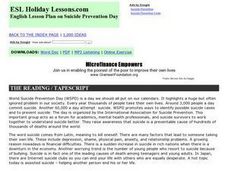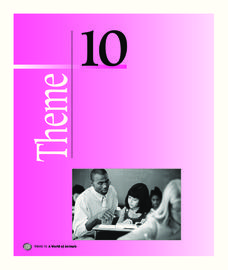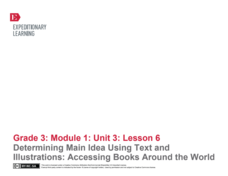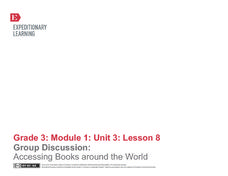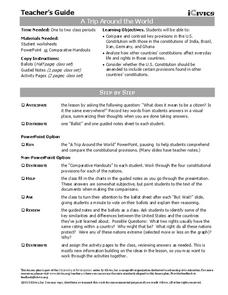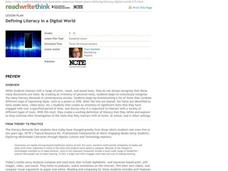NOAA
Climate, Weather…What’s the Difference?: Make an Electronic Temperature Sensor
What's the best way to record temperature over a long period of time? Scholars learn about collection of weather and temperature data by building thermistors in the fourth installment of the 10-part Discover Your Changing World series....
National Endowment for the Humanities
Soviet Espionage in America
The war against Communism and Joseph McCarthy’s place in it are the focus of a series of three lessons examining postwar America from 1945-1950. This first lesson asks groups to read an introduction that describes the Verona Project and...
NOAA
How Do We Know?: Make Additional Weather Sensors; Set Up a Home Weather Station
Viewers learn about three different weather measurement tools in installment five of the 10-part Discover Your Changing World series. They build weather vanes to collect data on wind speed, barometers to determine air pressure, and rain...
NOAA
Communicate!: Create a Unique Message About Climate Change
Scholars use their communication skills to express their take on climate change in the ninth installment of the 10-part Discover Your Changing World series. They create ways to deliver their messages on a specific aspect of climate by...
Core Knowledge Foundation
Chaos within the Living World? NOT!
What are the five kingdoms? Fifth graders engage in a series of investigations and research activities focused on the methods of classification used by scientists, as well as the language they use to describe the similarities and...
California Academy of Science
Exploring the Impacts of Feeding the World
Approximately 50 percent of people in the world who are chronically hungry work in agriculture. While it seems counter-intuitive, the farther you live from a farm, the more food options are available. Scholars explore concepts related to...
Prestwick House
Vocabulary in Context: Inside the World of Wizards
Enter the world of Harry Potter and learn new vocabulary at the same time. A high-interest reading passage provides insight into the history of Harry Potter. Follow-up activities incorporate key vocabulary strategies, such as using...
Curated OER
Living in a Geometrical World
Learners participate in a series of hand-on, online, and multimedia activities to examine 2 dimensional and 3 dimensional shapes. They describe common geometric solids. They construct rectangular prisms using straws and ribbon.
Messenger Education
Mission: Possible—How Can We Plan an Exploration of Another World?
An astronaut's spacesuit weighs 280 pounds and takes 45 minutes to put on — that's a serious suit! The second activity of a three-part series allows pupils to see all that goes into space exploration. Through simulations, groups analyze...
National Endowment for the Humanities
The Rise and Fall of Joseph McCarthy
"I have here in my hand . . ." The war against Communism and Joseph McCarthy’s place in it are the focus of a series of lessons examining postwar America from 1945-1954. Joseph McCarthy takes center stage in this, the final lesson of the...
Curated OER
ESL: World Suicide Prevention Day
Help to educate your ESL students about World Suicide Prevention Day with this series of activities. Matching key phrases, completing CLOZE paragraphs, and choosing appropriate words based on context clues are just a few of the many ways...
Chicago Botanic Garden
Climate Change Around the World
You know climate change is happening when you see a bee take off its yellow jacket. Part four in a series of five lessons explores all factors affecting climate change: temperature, cloud cover, precipitation, and carbon dioxide. By...
Houghton Mifflin Harcourt
A World of Animals: Challenge Activities (Theme 10)
Animals are the theme of this series of challenge activities. Extend scholars' learning opportunities by writing personal narratives and book reports, creating picture and alphabet books, and drawing scenes from stories read aloud.
EngageNY
Tax, Commissions, Fees, and Other Real-World Percent Problems
Pupils work several real-world problems that use percents in the 11th portion of a 20-part series. The problems contain percents involved with taxes, commissions, discounts, tips, fees, and interest. Scholars use the equations formed for...
National Endowment for the Humanities
The New Order for "Greater East Asia"
Sometimes the New Order becomes synonymous with its implications for European countries, but what about its consequences for East Asia? The final instructional activity in a four-part series teaches scholars about World War II. High...
Education World
Where in the World is Mrs. Waffenschmidt? #6
One of a series of geography worksheets that requires reading a paragraph with clues in order to determine the location of the fictional explorer, Mrs. Waffenschmidt. Reproducible with two per page.
Houghton Mifflin Harcourt
A World of Animals: English Language Development Lessons (Theme 10)
Animals are the theme of this series of English language development lessons. Scholars take part in grand conversations about woodland, jungle, and grassland animals. They also go on picture walks, read poems and high frequency words,...
Chicago Botanic Garden
Climate Change Around the World
It is unknown if cloud cover increases in response to carbon dioxide levels changing, helping climate change slow down, or if cloud cover decreases, allowing Earth to warm faster. Part four in the series of five lessons has classes...
EngageNY
Determining Main Idea Using Text and Illustrations: Accessing Books Around the World
Ease into informational text with the lesson suggested here. Part of a unit series, the lesson draws from previous lessons and acts as a natural moment to add in informational text. Class members read one section of My Librarian is a...
EngageNY
Group Discussion: Accessing Books Around the World
Continue work with an informational text by following the procedures detailed here. The plan, part of a series, focuses on My Librarian is a Camel. Class members complete text-dependent questions and then prepare for and participate in a...
National Endowment for the Humanities
Victory and the New Order in Europe
A New Order in Europe calls for a new lesson plan! This third plan in a series of four sequential lessons encourages high schoolers to read primary sources about the development of the New Order and follow up their knowledge with a...
iCivics
A Trip Around the World
How do the rights of citizens in other countries, such as India, Germany, Brazil, and Iran, compare to those of Americans? Take a closer look at the provisions of various foreign constitutions, and compare and contrast the protections...
Sea World
Saving the Wild: Conservation Around the World
Enhance your unit on conservation, ecosystems, or migration with a series of lessons about ways to save the wild around the world. Kids research types of conservation, such as recycling, and use their geography skills to map the...
ReadWriteThink
Defining Literacy in a Digital World
What skills are necessary to interact with different types of text? Twenty-first century learners live in a digital world and must develop a whole new set of skills to develop media literacy. Class members engage in a series of...
Other popular searches
- Baseball World Series
- 1919 World Series
- World Series History
- 2009 Baseball World Series
- Little League World Series
- World Series Jackie Robinson
- The World Series












